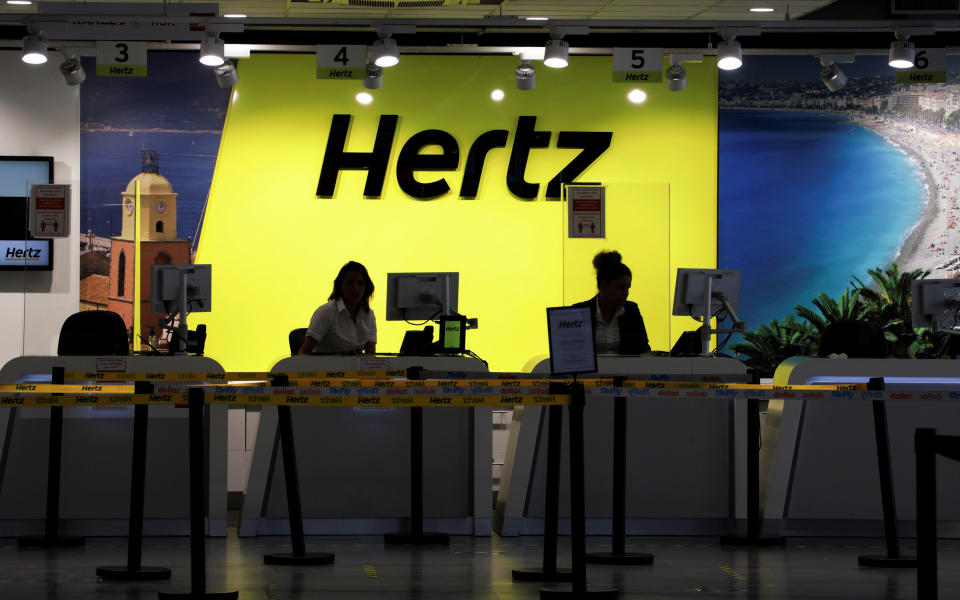Here's why CEOs get huge bonuses before their companies file for bankruptcy
The coronavirus pandemic has brought challenging times for U.S. companies, forcing them to lay off employees, close stores, and even file for bankruptcy. But many of their executives are still getting bonuses worth millions of dollars.
JCPenney, Hertz, and Chesapeake Energy are just a few of the companies that have given their executives prepaid retention bonuses to keep them with the company worth $7.5 million, $16.2 million, $25 million, respectively, just before they filed for bankruptcy protection.
Companies have found a way to pay generous bonuses while avoiding a high risk of creditors clawing them back or the bankruptcy courts limiting amounts. Cashay.com Editor Janna Heron sits down with Yahoo Money and Cashay reporter Denitsa Tsekova to better understand what is happening in the latest episode of the Money, Honestly podcast.
The podcast episode is based on reporting Denitsa did for the Yahoo Money article: “Companies filing for bankruptcy use loophole to give CEOs huge bonuses.”
Janna: Hi, this is money, honestly. I'm Janna Heron. And today Denitsa Tsekova. One of the reporters for my team at Yahoo Money and Cashay is joining us. We'll be talking about CEO bonuses from companies in bankruptcy. Denitsa, welcome. Thank you for joining us.
Dentisa: Thanks so much for having me again.
Janna: So, we have been reading a lot about companies that are going bankrupt. A lot of retailers, I think, JCPenny, for example, you saw J. Crew. I think Nordstrom was another one and a lot of it has to do with the coronavirus. So what is the landscape right now with these companies going bankrupt?
Denitsa: So, what we're seeing is since the start of the pandemic, as you said, especially retail companies and others have been struggling financially. They've been closing stores, laying off employees. Their revenues have been hit really bad. And what's been happening is when companies trickle, a lot of them are filing for bankruptcy protection or Chapter 11.
So, this is giving them a chance to reorganize the company and maybe try to emerge from that difficult times in their business. And they hope they're able to operate, after this happens and [they] are looking for ways to keep the company going.
Janna: Okay. So that's different than like a liquidation where we're just closing out all the stores, selling all the inventory and the company will not exist after the bankruptcy. This is where they're reorganizing and hoping that the company comes back as a new, better probably streamlined company.

Denitsa: Yeah. That's the plan. The plan is to go back to business and they, they continue working when they have filed for bankruptcy protection.
Janna: So, they don't stop the business. Okay. And so some of these companies have been offering some really good big incentives for some of their CEOs and other executives, before they file for bankruptcy protection. Can you talk a little bit about those bonuses?
Denitsa: So, yeah, interestingly, yeah. As part of that Chapter 11, that protection filing, a a lot of companies are trying to incentivize, that's how they often refer to it, their executives and their members of their senior teams, to stay throughout that process of reorganizing and trying to get back to business. And they motivate them, motivating them by giving them bonuses.
And those bonuses are well, I can say, pretty generous. They're starting from maybe $1 million going up to $6 million and this is added to their salary and their normal annual compensations. And some of those companies are Hertz, JCPenny, Chesapeake Energy, [and] Whiting Petroleum. They are some of the most recent ones that have filed for Chapter 11.
And they have paid those bonuses. And the total bonuses, for example, so for Whiting, for those companies goes up to $25 million dollars, the total amount they're paid to their executives. And this happens before they file for bankruptcy.
Janna: Before they file? Why, but they know that they're going to be filing for bankruptcy protection, right when they're making these bonuses? Or is it something like: “Oops, we paid these bonuses and now we realize we have to file for bankruptcy?”
Denitsa: Yeah. I think that's a really good question. Most of the time, they know, some people that's covered bankruptcies, they often say, when they give out those bonuses, it's a signal that the company will file for bankruptcy. And they're often doing that. Instead of doing it after they file. For a bankruptcy, the process, before that, is much easier and it's better for the executives getting the bonuses because it's just less so regulated and less scrutinized.

Janna: Well, we're scrutinizing it now. So I get what you're saying though. So, okay, so they do this before they file, because you said there's a lot of red tape. Otherwise, can you tell us a little bit about that red tape and also why is it they really want to incentivize these, CEOs or executives to stay on?
Denitsa: Yeah, so what will happens is a company sees they're running out of cash and they realize they'll probably have to file for bankruptcy protection. And they're trying to keep their executive team with the company. And one of the people I spoke to, who's a law bankruptcy professor, he had a really interesting analogy.
He said that people are getting anxious. They have to file for bankruptcy. So they're lining their ducks up in a row. And the first duck for the CEOs, that they most worry about, is their own salary. So they begin with that. And the whole process happens before the bankruptcy filing because they don't need a court's approval for that.
So, it's much easier. For those bonuses to be given out then, and there is far less regulation. For example, if they do that during the bankruptcy, after they filed for bankruptcy, the amount of money the executive gets, this is far less and there’s much higher chances for it to actually be clawed back.
So the regulation is that the bonus shouldn't be more than 10 times what your average employee makes. And if you do the math for this, this is very little for an average CEO will get. For example, in 2020, what an average CEO makes to their typical worker was 278 to 1. So, or, or 221-to-1 [depending on how it’s measured].
So, the average CEO makes at least 200 times more than a typical worker. So the limitation of 10 times more is giving them a very little bonus.
Janna: And they want to keep these CEOs and executives, you know, the same ones that were in charge of the company as it's going down, but they want to keep them in place, during the bankruptcy protection phase and reorganization?
Denitsa: Yeah, that's an interesting point. From what I got from the people who were actually working on those boards that are advising companies, how much bonus to pay to those executives, the initial idea is to keep those people who are really good and have a lot of knowledge about the company.
For example, you have a CFO, chief financial officer, who has worked there for like 20 years. He knows the company, finances inside and out. And you want to keep that person and you don't want to train someone new to look through all the balance sheets and everything of the company. Just now compared to that person who knows him very well, but what will happen is oftentimes there are many more people getting the bonuses.
If the idea was initially to maybe pay the CEO, the CFO, and that's it, maybe, I don't know, two more people sometimes. Like for example, one company I was looking at it, I think it's 340 people they gave bonuses to. So the initial idea of just to pay two or three people get stretched to maybe a few hundred.
Janna: Oh, wow. So those few hundred people, are they like regular employees or are they more like higher management and stuff like that?
Denitsa: So for, I was talking about Hertz, it's actually, they paid 304 a total of 1$6.2 million. And in their filing, they say they've paid employees at the director level and above.
So, this includes obviously their CEO. There's also their executives, but then every one of the director, not everyone, but some people at the director level and above
Janna: Sounds like a very broad compensation. Right, right. Okay. But still you're more high, you're higher up in the company. We're not talking about like, for example, JCPenny closing like what almost 150 stores, those retail associates are probably not getting any kind of bonus because they're probably being laid off and not necessarily kept on with the company.

Denitsa: Oh, for sure. For sure. The majority of the time, it's just, just the C-suite, its executives, and sometimes people at the director level, like the CFO go and pull you in and get such a bonus.
Janna: Right, right. Okay. Interesting. Give me a second. Oh, you talked about something about clawing back these bonuses. If they're done after the company files for bankruptcy, can you explain what that means?
Denitsa: Well, the case is that first, it's easier to give those bonuses before filing, than if you make that bonus payments after, yeah.
In bankruptcy, while it's fair, it's very likely to be attacked [by creditors]. I know sometimes it can be kind of worded as an incentive. And then after the bankruptcy, this also gives you a very high chance of it being attacked. It’s legal in courts and the best way for you to keep the bonuses, and surviving throughout the court is to give it before you have filed for bankruptcy, because it gives less legal reasons for people to claim it back.
And this is actually a regulation that has been in place in the last 15 years. So this practice of giving out the bonuses before filing has become much more common since the reform was introduced.
Janna: Right. Okay. So can we talk about the companies that you looked at in your reporting, where you found these bonuses? You know, you did mention Hertz, but you also talked about JCPenny and what some of their bonus structures look like and what were the reasonings they gave.
Denitsa: Yeah. So JCPenny, for example, gave a total of $7.5 million. They gave it to only executives, so they didn't really go down to director level and such.
And for example, their CEO got $4.5 million bonus to stay with the company throughout that process. Then we have Hertz. They paid $16.2 million in cash retention bonuses. As we mentioned, this was 340 employees and their CEO got the $700,000 bonus.
Then we have Chesapeake Energy. [Of] the companies we looked at, this has given one of the most generous bonuses. It has given a total of $25 million to 21 of its executives.
And then we have Whiting petroleum, which gave $14.6 million in cash bonuses, and it gave one of the most generous bonuses to CEO, which is worth $6.4 million. So we're going to see pretty big numbers, up to total goals above $10 million.
It really depends obviously on the industry, on how many people were given bonuses, but the reasons are pretty similar. So in the filings, we see those companies justify the payments by saying that this is part of their decision as to how to handle their uncertain future. And this includes taking necessary steps to retain talent.

They also say, for example, their historic compensation structure wasn't good enough to incentivize and motivate the workforce. So they're making this new change. They're giving out a bonus and they have revised compensation structure to keep the company going.
Janna: Yeah. But during all of this, a lot of these companies are also just laying off their regular workforce, right as they move through their bankruptcy protection reorganization?
Denitsa: Yeah. So that's interesting that a company dedicated maybe $10 million to incentivize their executives, but what happens to the kind of typical worker level is very different. For example, Hertz, in April, they said they plan to lay off 10,000 employees across North America, which for a company like Hertz, which has 38,000 employees, is really a huge part of their workforce.
So this company sees, I don't know, more than a fourth of their workforce for being cut and, at the same time, gives millions to their executives.
JCPenny is a similar case. We don't know how many people have been laid off, but there have been 148 store closures after the filing for bankruptcy and it's expected for 250 stores to be closed.
So this will also likely result in job losses for Chesapeake Energy. We also have reports that some of its employees have been laid off. So, you know, while those bonuses are being handed, we see a lot of people losing their jobs.
Janna: It makes it seem a little unfair, especially given this environment when so many people are losing their jobs due to the pandemic’s fallout. Anything, anything else that we didn't touch on or I didn't ask about Denitsa that you think is really important about the story.
Denitsa: I think it's interesting that this practice is not new. It's been going on for a while in maybe some shape or form. But what is interesting is that this practice is normally based on your compensation as a CEO, and or, or other type of executives. And that compensation has grown dramatically in the last 30 or 40 years while the compensation of an average worker hasn't really.
So for example, going back to the total numbers I told you earlier, in 2020, the CEO to typical worker compensation is 278-to1. And looking back to 1965, it was 20-to-1.
Janna: Wow.
Denitsa: So this is a really big growth and not only their compensation or that their bonuses are bigger and you know, that kind of discrepancy of those people getting even bigger bonuses while people lose their job is what is maybe problematic in that process.
Because, you know, people who are defending that practice are saying that those companies really need those people to stay through that process. But then the real question is how much do they need to be paid throughout that process with so many employees being laid off
Janna: For sure. And especially if you went back to like that 1965 example, when you said it was like 20- or 21-to-1 when it came to the CEO-to-worker compensation ratio. So that's when 20-to-1 is a lot closer to that bankruptcy regulation that you said that they can't pay a bonus larger than 10 times what the typical worker makes. So that's not nearly as off as it is today. Yeah, so maybe that's why, you know, the government tried to regulate those types of bonuses.
Denitsa: It doesn't seem to work so far because we're seeing obviously very different ratios of, compensation. But yeah, there was an attempt to kind of regulate the threshold for those bonuses, but they found a loophole. Yeah, there are seen, there seem to be a loophole. All these companies have given out those bonuses sometimes, a month before, sometimes days before that.
And you know, it's not something that it's hard to define. Like it's obvious it's to retain those people, legally. It just seems to work better than doing it after they filed for bankruptcy.
Janna: Well, Denitsa. This has been a really, really interesting conversation. I didn't know anything about CEO bonuses during bankruptcy. I've heard about CEO bonuses in general, but this is really eye-opening.
So thank you, Denitsa, for joining us today on Money, Honestly, and thanks for everyone listening. Head over to Apple podcast and leave us a five-star rating and review. We'll see you next week.
Denitsa is a reporter for Yahoo Finance and Cashay. Follow her on Twitter @denitsa_tsekova.
Read more information and tips in our Career section







